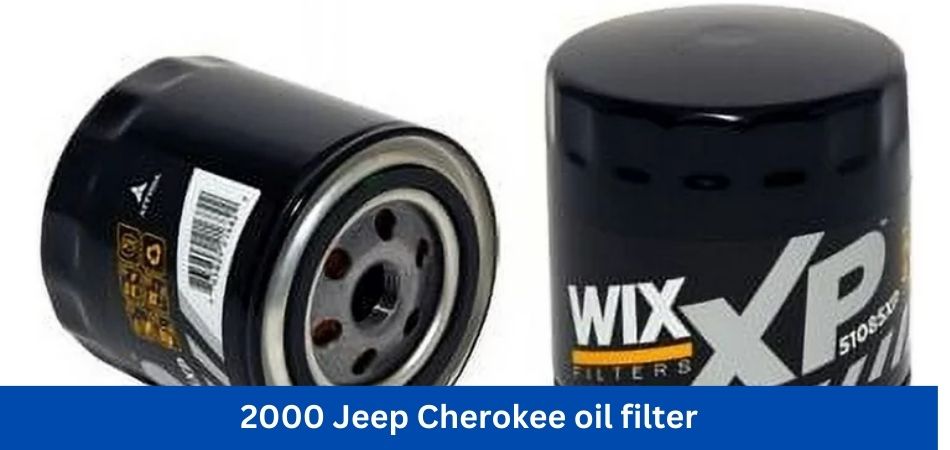
A boxy, old-school body shape and respectable off-road abilities characterize a 2000 Jeep Cherokee. Depending on the size of the engine, its engine oil capacity is four or six quarts. To keep your Cherokee operating well, you should replace the oil every 3,000 to 5,000 miles.
Jeeps are known for their dependability, so if your 2000 Cherokee is still in good working order, chances are you already know how much oil the engine can hold, but if you’re still unsure, we’ve got your back.
We’ll go over how much oil your Jeep Cherokee’s engine requires, as well as what type of oil is best and when an oil change is due.
2000 Jeep Cherokee Specifications
Engine
| Engine Type | Piston |
| Engine Location | Front |
| Engine Size (cc) | 3960 cc |
| Engine Size (L) | 4.0 L |
Transmission & drivetrain
| Gears | 4 |
| Gear Type | Automatic |
| Generic Gear Type | Automatic |
| Gear Location | Floor |
Fuel
| Fuel Type | Petrol – Unleaded ULP |
| Fuel Capacity | 76 L |
| RON Rating | 91 |
| Fuel Delivery | Multi-Point Injection |
2000 Jeep Cherokee Overview
For the 2000, a redesigned 4.0-liter six-cylinder heads up the engine line. The Cherokee has been a quick SUV with a straight-six; this new engine reduces emissions. Ordering four-wheel drive makes the Cherokee thoroughly capable when the pavement ends.
The 2000 Jeep Cherokee comes in many forms. Two-door and four-door models are available. Two engines are available, a four-cylinder and a six-cylinder. Two-wheel-drive and four-wheel-drive models are available, though why someone would want one of these with two-wheel drive escapes us. Cherokee has four trim levels: SE, Sport, Classic, and Limited. Each trim level builds on those below it.
SE models come with the 2.5-liter four-cylinder engine. They range in price from the two-door 2WD SE ($16,680) to the four-door 4WD SE ($19,230). SE comes with wind-up windows and vinyl upholstery. Air conditioning is optional.
In addition to the new 4.0-liter six-cylinder engine, sport variants now feature premium cloth. Air conditioning, power windows, power locks, power mirrors, remote keyless entry, a tilt steering column,, and a rear wiper washer are standard equipment on Sport variants. The base price of a four-door Sport 4WD is $21,570. Classic incorporates a more refined fabric and enhanced detailing.
Exclusive variants include leather upholstery in addition to other amenities. The Selec-Trac full-time four-wheel-drive system from Jeep is standard on Limited 4WD models and a $605 option on other specification levels.
2000 Jeep Cherokee engine oil capacity
The 2000 Jeep Cherokee Capacity has either a 2.5-liter four-cylinder or a 4-liter six-cylinder engine. If your Cherokee has a four-cylinder engine, the engine oil volume is four quarts. The base model SE is the only trim with this smaller engine.
All other 2000 Cherokee models have a six-cylinder engine with a six-quart oil capacity. These trim levels are as follows:
Sport
Classic
Limited
Why Your 2000 Jeep Cherokee Needs To Have Oil?
The engine in your Jeep is a complex and complicated machine with many fast-moving parts packed into a tiny space. Motor oil forms a layer as a fluid barrier between bearings, engine pistons, cylinder walls, and other engine components, lubricating the parts and preventing them from rubbing against each other and wearing out. An engine without oil will quickly lock up and become irreparably ruined. Not only does your Jeep require oil, but it should also be changed regularly. Heat and impurities damage the oil over time, reducing its lubricating capabilities. Oil guards against corrosion, heat breakdown, and engine sludge. Maintaining your engine properly maintained with frequent changes of oil is a simple means to give your Jeep some love and extend the life of your Jeep.
What kind of oil does a 2000 Jeep Cherokee need?
Now that you understand what amount of oil goes into your Cherokee’s engine, you’ll need to know what engine oil to use. The oil type recommended by the owner’s manual for the 2000 Jeep Cherokee is SAE 0W-20 completely synthetic motor oil.
The mixture of numbers and letters appears to be complicated, but it is relatively simple. SAE is the abbreviation for the Society of Automotive Engineers, a century-old organization in charge of global oil classifications.
The viscosity of engine oil is measured, which is another way of indicating how thick the oil is. A viscosity of “0W” indicates that the oil will remain relatively thin in freezing temperatures. This is why the letter “W” stands for winter.
When oil is labeled 0W-20, the “20” implies it can resist high temperatures. For drivers who live in colder areas, 0W-20 oil is usually a good choice.
Various oil companies produce 0W-20 synthetic oil, but if you’re hesitant, you may go with Mopar SAE 0W-20 oil. Mopar is an automotive company that sells original equipment manufacturer (OEM) components for Chrysler, Dodge, Ram, and Jeep.
Given that your Cherokee has been around for more than two decades, it likely has many kilometers on it. Another decent engine oil alternative is Mobil 1 Extended Performance High Mileage 5W-20 Full Synthetic Motor Oil, developed explicitly for vehicles with 80,000 to 100,000 miles on the odometer.
How often to change the oil on a 2000 Jeep Cherokee
The owner’s manual for the 2000 Jeep Cherokee suggests changing the oil every 3,000 to 5,000 miles. You should also check your oil around once a month to ensure it is at the proper level and does not appear unclean.
You can check the oil in your Cherokee using the dipstick under the hood. The oil level should be within the lines on the dipstick, not too high or too low. The oil should be a light honey-brown color with a translucent opacity.
If you check your oil and observe that the color is dark brown or black or the texture is gritty or sludgy, it’s time for an oil change.
It’s also critical to be aware of how your engine performs. A smokey stench, lagging, or clunking sounds from the engine are your Cherokee’s way of notifying you that maintenance is required right now.
What can be the Longest Oil Change Interval on a 2000 Jeep Cherokee?
Most cars require an oil change every 5,000 to 7,000 miles. The maximum replacement of oil frequency extends to around 10,000 miles if you use synthetic oil.

Remember that these are only 2000 jeep cherokee oil capacity guidelines, and the actual interval will vary depending on the make and model of your vehicle. For a particular suggestion on oil change intervals, consult the owner’s manual.
How to change your oil and oil filter on a 2000 Jeep Cherokee?
If you are confident in your ability to change your Cherokee’s oil on your own, this might be a significant savings. Make sure you have the following supplies before you begin:
Gloves made of rubber
Funnel for eye protection
Drain pan for oil
Wrench with a 16mm diameter
A metal strap wrench or an oil filter
Oil filter replacement
4 to 6 quarts of engine oil

To begin, open your Jeep hood and remove the engine oil cap. Keep it somewhere secure while you change the oil by following these steps:
Place the oil drain pan below the oil drain stopper in the oil pan’s back.
Remove the oil drain cap with your wrench. It should take several minutes to drain all of the oil.
Reinstall the drain plug manually and carefully tighten it with the wrench—too much tightening will shred the oil drain plug threads.
Locate the oil filter beneath your Jeep, directly above the starter, and slowly loosen it while carefully not damaging any other components nearby. Place a drain pan beneath it.
Hand-detach the oil filter. Keep the filter upright to avoid spilling any more oil than necessary. Ascertain that the O-ring is securely fastened to the top of the oil filter.
Reinstall the new oil filter by hand, coating the O-ring with clean oil.
Fill your engine with engine oil by using the oil funnel.
After that, restart your engine and check the oil level. You’re good as long as the level looks excellent!
How To Avoid Costly Mistakes During Oil Change?
Changing your oil may appear to be a simple task, but mistakes can be costly.
First, you need to replace the oil filter. The filter removes hazardous impurities from your engine, and if you don’t replace it regularly, you may need to replace your engine sooner rather than later.
Mistake number two: You spill oil on your engine. With enough heat, your engine can catch fire and smoke you out of your car. Pour with caution, and replace the oil cap.
Mistake #3: You use the incorrect oil viscosity. Your Jeep engine has particular oil channel diameters for a given oil viscosity. Stick with 0W-20 if it says so. Using a different viscosity may weaken engine protection, wearing it down before its time.
Mistake #4: Using too much or too little oil. Inadequate oiling can disrupt hydraulic pressure and reduce lubrication. However, putting in too much can be just as harmful, causing hydraulic pressure to fluctuate and gaskets and seals to leak. Paying close attention will assist you in avoiding these costly errors.
Why is Oil Maintenance Important for Your 2000 Jeep Cherokee?
Regular oil changes help to keep your engine clean.
When oil flows into the engine from other places, dirt, and particles gather inside it. Sludge will begin to accumulate in your engine if you do not change your oil at the recommended intervals. Those who live in drier, dustier environments will have even more particles passing through. Changing your engine oil and replacing your filters regularly can get any hazardous particles of dirt and debris out of your engine before they cause any damage.
Routine oil changes increase the likelihood of a longer engine life.
Your car’s lifeblood is oil. It lubricates and protects your engine and many of its vital components from wear and damage. The issue is that oil accumulates dirt. Changing your oil and filter according to your owner’s handbook guidelines will keep your engine clean and safe while saving time, money, and worry. A regularly planned oil change is an effort that will help make sure you will drive about in your car for many years to come.
Oil changes protect other engine components.
What exactly does oil do in my car? The crankshaft and connecting rods are two of the many critical components that make your engine work. These rods are in charge of the pistons within your engine’s cylinders. Another component is the camshaft, which aids in the opening and closing of the vehicle’s exhaust valves. Maintaining clean oil in your vehicle’s engine is critical to keeping all of these components moving and working smoothly.
Increase your gas mileage by changing your oil on time.
I’ll get more excellent gas mileage if I change my oil on time. How exactly does that work? Finding a fuel-efficient car is crucial to all of us. Various factors influence overall miles per gallon, including the atmosphere, topography, personal driving habits, and vehicle maintenance. Without regular maintenance, all of that dirt and grit we discussed before will accumulate within your engine, generating friction, and friction is not your engine’s friend. Friction is the adversary of optimal engine performance and fuel economy. Maintaining clean oil in your engine can assist in decreasing friction, allowing your engine to operate more effectively and get the highest gas mileage.
Pass Your Emissions Test and Help the Environment
Passing an emissions test is about how many of these particles, known as hydrocarbons, are spewed into the atmosphere. If you don’t replace your oil regularly, unclean oil generates a buildup of these hydrocarbons inside the crank case of your engine. These are subsequently burnt, causing more to be discharged into the atmosphere via the vehicle’s exhaust. You will not only pass this essential emissions test if you change your oil on time but also pollute less.
Routine oil changes improve engine performance.
Due to heat exposure, old oil degrades over time. As a result, it loses viscosity and the capacity to lubricate the engine cylinder walls. Essentially, the dirtier the oil, the more difficult it is to get to where it has to go. This sludge accumulates in regions where it obstructs lubricant flow to sections requiring it. Another purpose of oil is to remove heat from engine components. These parts stay hotter for longer if they are coated with muck. Eventually, the engine’s performance will suffer as it loses gas mileage and horsepower.
How To Properly Dispose Of Used 2000 Jeep Cherokee Oil?
As previously said, motor oil may be very detrimental to the environment, so be sure it is properly disposed of. Because used oil may readily pollute rivers, never throw it down the drain or into the garbage. Recycling is the greatest method to get rid of trash. Remove the used oil from the drip pan and place it in a clean plastic or metal container (an old Clorox bottle, for example). Make sure it’s well-sealed. Then take it to a recycling facility—most auto parts stores will recycle the oil for free, or you can use this useful link to find a recycling center near you.
Final Words
Jeeps are safe and dependable cars. They are an excellent alternative for spending time with your family on an expedition away from city streets and onto harsh terrains.
You don’t want to be stranded in the middle of nowhere because you didn’t pack enough oil.
As a result, always ensure you have adequate oil for vacations. That is why you must determine its 2000 jeep cherokee oil capacity if you possess a Jeep 4.0. Drive carefully!
FAQs
What oil capacity is suggested for a 2000 Jeep Cherokee?
The oil capacity of the 2000 Jeep Cherokee is roughly 6 quarts. However, it is critical to consult your owner’s handbook for exact details.
When should I replace the oil in my 2000 Jeep Cherokee?
Oil should be changed every 3,000 to 5,000 miles, but check your owner’s handbook for the manufacturer’s particular recommendations.
Can I use synthetic oil in my Jeep Cherokee 2000?
Yes, synthetic oil may be used in the 2000 Jeep Cherokee. It frequently improves engine performance and provides more excellent engine protection.
What if I put too much oil in my 2000 Jeep Cherokee?
Overfilling the oil might increase pressure inside the engine, which can cause harm. To avoid such problems, it is critical to adhere to the specified oil capacity.
What is the best way to check the oil level in my 2000 Jeep Cherokee?
To check the oil level, park in a level area, wait for the engine to cool and then use the supplied dipstick. Check that the oil level is within the prescribed range.







Leave a Reply